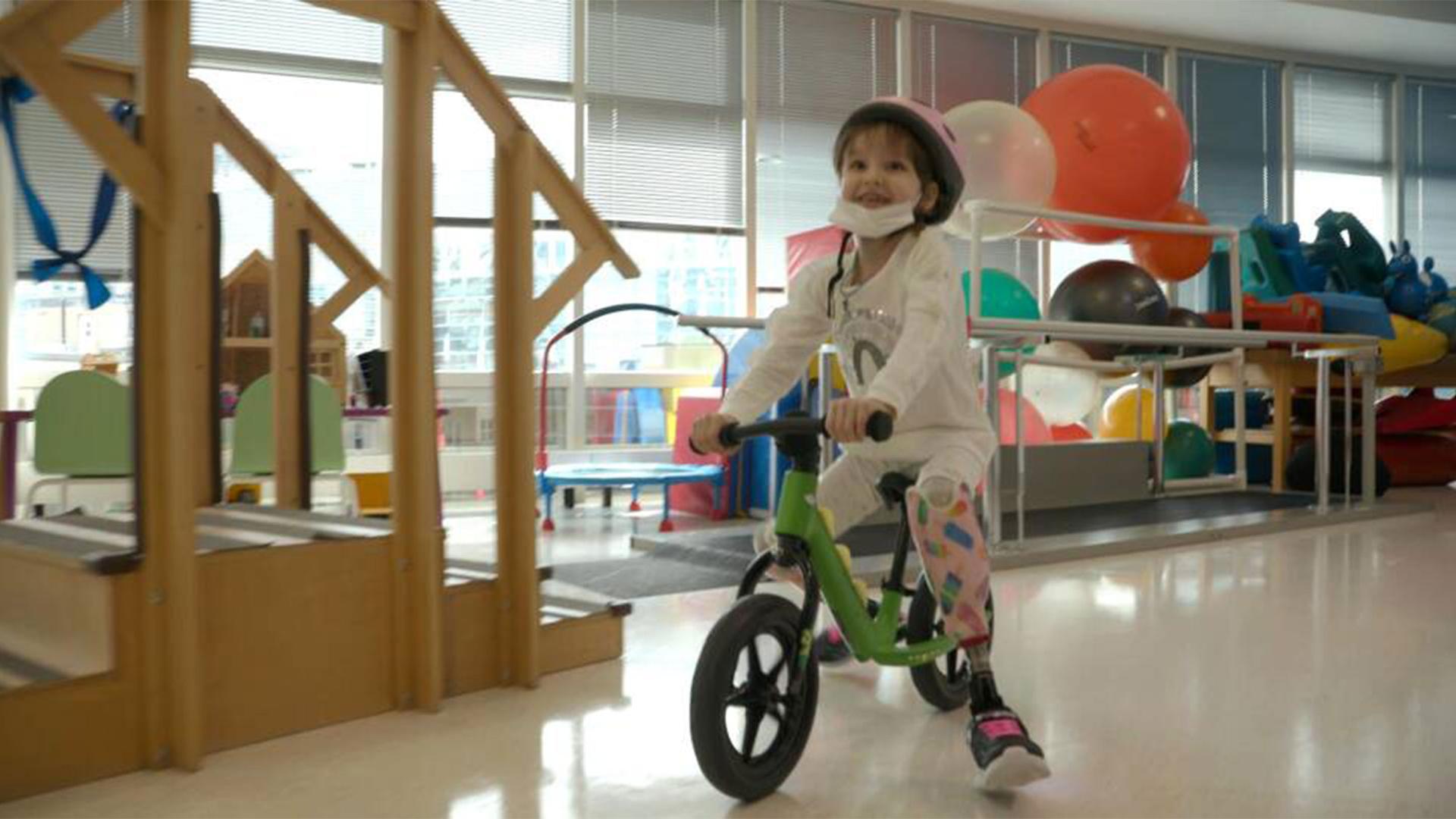In October, 6-year-old Karolina Daremyan was sleeping with her mother when Russian forces shelled their home in Nikopol, Ukraine. The mother was hospitalized, and the young child’s injuries were so severe that both of her legs were amputated below the knee.
United Nations human rights watchers have recorded over 500 children killed and almost 1,000 injured since the Russian invasion in February 2022. They think the true figures are considerably higher. The Ukrainian hospital system has been overwhelmed, and only a fraction of those injured children have been able to make the difficult journey to the United States for complicated medical procedures and rehabilitation.
Karolina is one of the lucky ones.
What it takes to get one child into a hospital
She and her godmother would become beneficiaries of a tight-knit network of do-gooders, traveling to get Karolina medical care at the renowned Shriners Children’s Hospital in Boston. The hospital has helped nearly 2,000 international children since 2005.
“The medical system is so stressed [in Ukraine], the high-resource needy cases are very difficult to support,” said Dr. Robert Sheridan, Shriners’ chief of staff. “A case that perhaps they could have managed before February 2022, they just are completely overwhelmed that they don’t have the resources that that child would need.”
BREAK
Since Russia’s invasion, five Ukrainian children have made their way to Shriners in Boston, and another six have gone to other hospitals in the Shriners network across the country — including one child who lost her arm, and another injured in a collapsed building due to a missile strike.
Karolina and her family found their way to a Polish refugee camp in late spring, where they met Daria Khatina. The 35-year-old, also Ukrainian, became a close friend.
Months later, the family decided to leave the camp and go back to Ukraine. But just hours after they returned to Nikopol, Russians shelled their home.
“I didn’t want to believe it, I couldn’t believe that it happened the same exact day. It was shocking, it was painful and it was hard,” Khatina said in an interview interpreted from Ukrainian.
With her mother hospitalized, Karolina was shuttled from one hospital to another that might better perform her amputation. Her aunt was posting on Facebook about the horrific event, and supporters around the world were sending their condolences and suggesting what could be done to help the little girl. Karolina’s family was ultimately connected to the Ukrainian Embassy to the United States and Ukraine House, a DC-based nonprofit founded by the First Lady of Ukraine, Olena Zelenska.
The two groups reached out to Shriners, which reviewed her case and accepted her for treatment. With Karolina’s father taking care of her two younger siblings, Khatina volunteered to accompany Karolina on the journey, taking on a new role as godmother and leaving her ownthree children behind.Ukraine House and the embassy arranged travel and coordinated visitor visas.
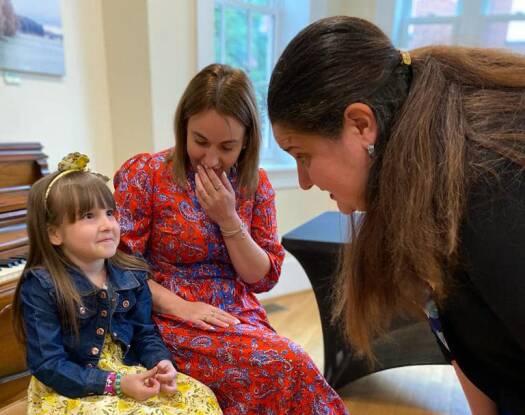
“No children [should] have to be subjected to that,” Markarova said in an interview with GBH News. “This unfair, unprovoked, completely unjustified war is not only unfair to our country, but then you meet children like Karolina and you see what devastating effect it has on people and families, on kids.”
Moving into humanitarian aid is how the embassy ended up helping Karolina. When the war started, the nonprofit Ukraine House shifted its focus, too, from cultural programs and promoting cross-cultural exchange to fundraising. They launched a program last year called “Unbreakable,” a prosthetics rehabilitation program that Karolina is part of.
Karolina’s story
Khatina had thought Shriners would be “very hospital,” but was delighted to see the bright colors and toys that made it a lot less scary.
Khatina and Karolina flew to Boston in January. Volunteers brought together by a local Facebook group met them at Logan Airport with welcome signs and teddy bears. They went straight to Shriners, staying in hospital apartments while Karolinaunderwent a laundry list of medical tests to make sure she didn’t need further operations.
Luckily she didn’t, and prosthetic care could start.
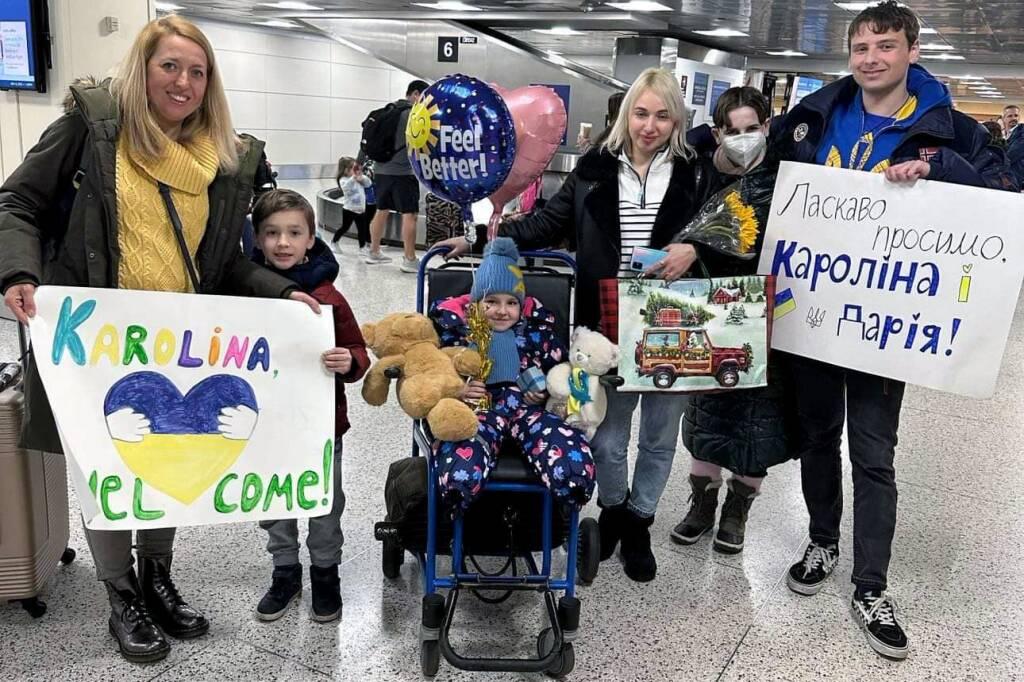
Karolina’s team included Brock McConkey, manager of pediatric orthotics and prosthetics, and physical therapist Hilary Smith.
“My first meeting with Karolina, she was sitting there smiling, big and bright,” McConkey said. “It’s tough coming from another country and instilling trust in a foreigner, so I try to just present with some big smiles and laughs, and try not to take things too seriously. And she was very warm and welcoming to us.”
She was fitted for prostheses, which arrived a few days later.
In a video from that day, Karolina watched as McConkey unwrapped a bright pink prosthetic piece, covered in stickers. “That’s the one,” he said while she nodded.
They put on the liners to protect her knees, and then the socket, a prosthetic piece that grips the residual limb. What happened next was unexpected.
“I don’t think in all my years at the Shrine, I’ve had a patient jump up as quickly as she has, and take off.”
“She stood up and took off right away. I don’t think in all my years at the Shrine, I’ve had a patient jump up as quickly as she has, and take off,” McConkey said.
“We were extremely emotional, me and Karolina,” Khatina said in an interview, wiping away tears. “She was already knowing it wasn’t just gonna be new legs. They won’t just magically grow. She knew it would be a new leg, but different, special legs.”
Those first steps happened in February. Khatina and Karolina stayed at a nearby apartment for outpatient treatment for over a month while Karolina’s left knee got stronger and she learned to live with her prosthetic legs.
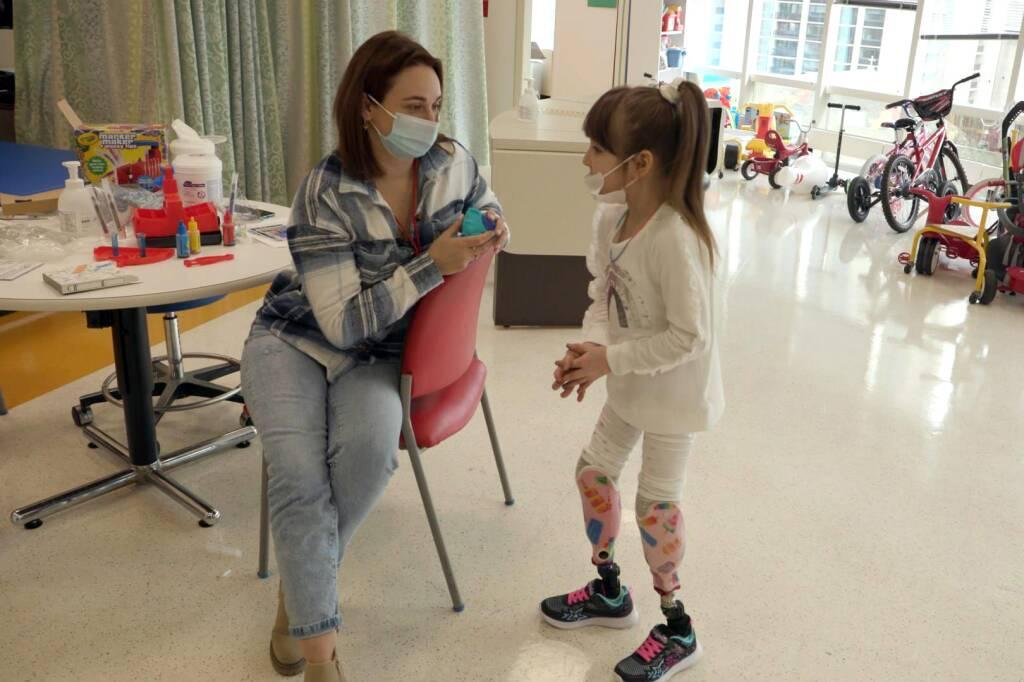
In just six weeks, she re-learned how to walk, run, bike and even play basketball. McConkey, Smith and the medical team at Shriners saw key improvements to Karolina’s progress, particularly that she could play with other kids for long periods of time without exhaustion or pain.
Smith video-chatted with Karolina’s mother about her continued care. She will outgrow the prosthetics within the year and return to Boston for new ones.
On Karolina’s last day at Shriners, her medical team brought her in for a final physical therapy session before she left Boston. The bright room was filled with toys and tools: scooters, bikes, a set of stairs to practice walking up and down, a little basketball hoop in the corner and a few short kids tables where she could sit and draw.
But Karolina didn’t want to draw: she was energetic and ready to get moving. There was just one problem: She couldn’t decide between riding a red scooter or a green bike. Either way, she needed a helmet. McConkey handed her a pink one.
Khatina said Karolina was excited to see her family, but doesn’t realize the danger in Ukraine. She doesn’t talk about the night of the shelling.
“Karolina is very strong and brave. And she doesn’t talk about it. She’s not saying anything about what happened, what she felt,” Khatina said.
Before they left Boston in mid-March, they visited the New England Aquarium. The pair had gone when Karolina was in her wheelchair in the weeks after they arrived in Massachusetts.
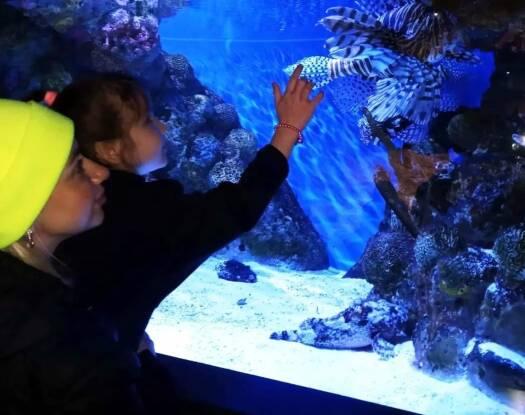
Khatina said the war “changed every single Ukrainian,” and that she was grateful to see so much support from the United States, not just for Karolina but also for her country.
“The only thing I want to say is that, as a mother, I want my kids to be healthy, happy and safe,” she said. “We want to feel safe to go to bed. We want to be sure that we’ll be awake in the morning.”
Related: ‘Trade is trade and war is war’: Romanian farmers say helping Ukraine is hurting their bottom line
This story first appeared on GBH Morning Edition on April 27, 2023.
